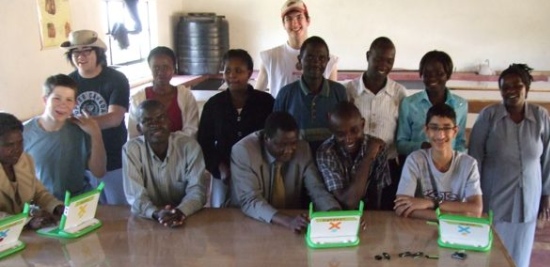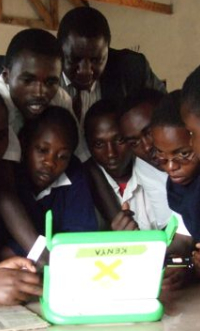My name is Mark Battley and I'm the Head of Digital Media at Upper Canada College (UCC) an independent boys' school in Toronto, Canada. My colleague, Craig Parkinson, and I have just returned from Northern Kenya where we've been working on the second stage of a small-scale OLPC implementation at Ntugi Day Secondary School. The Lewa Wildlife Conservancy, were our local hosts and facilitators since Ntugi is one of a number of schools supported by Lewa's Educational Programme.
I thought our collective Kenyan-Canada project might be of interest to the OLPC community because it is unusual in several ways:
- Our implementation is at the secondary school level, not a primary school.
- The initial stage of implementation in March 2009, was designed and executed by four 15 and 16 year-old high-school students from UCC.
- When we arrived at Ntugi, there was no power, no student had ever touched a computer, nor had they heard of the Internet.
- We were able to establish full - and portable - wireless Internet at the school by using a unique combination of solar power, domestic Safaricom SIM cards and modems, CradlePoint wireless routers, and Tekkeon batteries.
- We are using Vernier USB data sensors in combination with the XO's in both Science and Geography
- The Ntugi school and UCC are co-developing collaborative curriculum in Geography (and soon, we hope, in Science)
- In the fall, we are hoping to have twinned classes in Toronto and Kenya - working on the same equipment, technology and curriculum.
With the OLPCorps implementations now underway throughout Africa, I thought I would contribute a couple of posts about our experiences, challenges and successes - in the hope that they may be useful to other groups struggling with the same issues.

In the meantime, you can learn more about the history of our project and see pictures from the students' implementation back in March, and check out Ntugi's own school blog - created using the XO laptops.
Future posts will explore, in more detail:
- Student initiative in the design of the implementation.
- The role of Lewa, our Kenyan partner, in facilitating our project.
- Using cell phone SIM cards and CradlePoint routers to deliver wireless Internet.
- Solar power for the XO laptops.
- Twitter and blogging for Ntugi staff and students
- Vernier data sensors and the OLPC
- Collaborative curriculum between Canada and Kenya
In the meantime, if you have any questions, or would like to support Lewa and Ntugi's programme, please email me for more information.



You appear to have full internet capability. Are you using (or have you considered using) a Jabber (Mesh server in Contol Panel) in your "twinning". Several Jabbers are available :
http://wiki.laptop.org/go/Community_Jabber_Servers. The use of XO "sharing Activities" has geat potential, even considering the time difference.
Browse Activity with "bookmarks" can share web pages. Write Activity
can share draft documents or act as a "bulletin board" for XO's. Memorize Activity can share custom "flashcards" between XO's or flashcards can be downloaded using Browse Activity.
A beautiful example is the flashcards by Maryse Benzler in Oceania:
http://xoshare.org/card